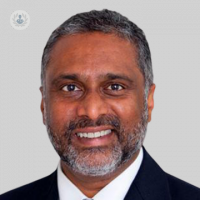Series (Part One): GORD - An introduction
Written in association with:Consultant physician and gastroenterology specialist, Dr Andrew Thillainayagam and Dr Neil Galletly, clinical research fellow, consider the impact of gastro-oesophageal reflux disease (GORD) diagnosis and how it can be managed. In part one of this three-part series of articles, read a comprehensive summary of the condition.
Also known as GERD or acid reflux, GORD is a common gastrointestinal disorder. So much so, general practitioners (GPs) find it is one of the most frequently encountered gastrointestinal conditions in the primary care sector.
It can affect patients of all ages. A UK survey of 2,000 households found that 20 per cent of adults have significant GORD symptoms more than twice a week. Up to 44 per cent also said they have symptoms at least once a month and seven per cent have daily symptoms.

What is GORD?
GORD refers to the backflow action of gastric contents into the oesophagus. This results in acid and pepsin to attack the oesophageal mucosa (lining of the oesophagus). Reduced pressure and too much of a relaxation of the lower oesophageal sphincter is one factor that can contribute to why GORD occurs.
The acid and pepsin action can result in reflux oesophagitis which leads to inflammation of the lower oesophagus lining, erosion and even ulcers.
However, fewer than half of GORD patients will have oesophagitis and at endoscopy, most have no detectable changes to the lining. These conditions are sometimes referred to as endoscopy-negative reflux disease (ENRD) or non-erosive reflux disease (NERD).
If oesophagitis is found as a result of an endoscopy procedure, its severity is classified by the size and amount of erosion or ulcers and a grading system is used. It’s found that around 80 to 90 per cent of patients have mild to moderate oesophagitis.
What are the symptoms of GORD?
The main symptom of GORD tends to be heartburn. Even if you don’t have severe oesophagitis or it isn’t present at all because of ENRD or NERD, heartburn can be frequent and severe. Patients with oesophagitis and ERND and NERD have similar symptoms.
Others can include:
- Acid regurgitation (acid brash)
- Belching
- Dysphagia (trouble swallowing)
Are there any other conditions that are related to GORD?
A minor, but significant, amount of people with GORD have respiratory symptoms like a persistent cough, recurrent asthma, or dysphonia. They may initially be seen by a respiratory specialist.
Other patients may be incorrectly referred to a cardiologist if they have chest pain that is non-cardiac related due to oesophageal spasm.
How is quality of life for people with GORD affected?
The frequency and severity of heartburn, unrelated to the presence or absence of oesophagitis, as a result of GORD can seriously affect quality of life.
- 75 per cent of people surveyed experienced low-quality or interrupted sleep
- GORD patients have reported worse emotional well-being than patients with diabetes or hypertension
However, after treatment, qualify of life rapidly improves.
Find out about the diagnosis methods for GORD in part two of this GORD series, or living with GORD in part three.
Want to treat GORD symptoms you may have? Get reassuring, expert advice from one of London’s top gastroenterology specialists, Dr Thillainayagam. Visit his Top Doctors profile here.



